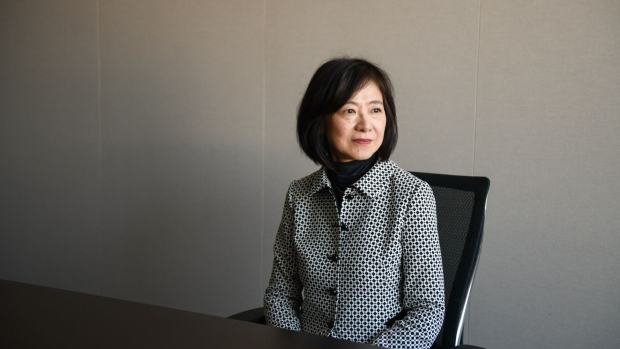Mar 14, 2024
Ex-BOJ Official Sees Chance Pay Results to Prompt March Hike
, Bloomberg News

(Bloomberg) -- A former Bank of Japan official sees a chance the bank’s policy board will seize the opportunity to end its negative interest rate on Tuesday after early results of wage negotiations came in strong.
“Given the strong results of pay talks so far, I think there’s a possibility the BOJ will move in March,” Yuri Okina, now chair of the Japan Research Institute, said in an interview on Thursday. Previously, she saw an equal likelihood of the BOJ making the move either this month or in April. “There is a feeling now that the preconditions for policy normalization have been met,” said Okina.
Last year, Okina was seen by some BOJ watchers as a potential candidate to become the bank’s first female deputy governor, but the two deputy positions wound up being filled by male veterans.
A Bloomberg survey of economists released on Tuesday showed that a slim majority of BOJ watchers still expected the end of negative rates to come next month. At that time, BOJ officials held the view that the timing for a hike was getting closer, with the outcome for next week’s meeting still too close to call, according to people familiar with the matter.
That was before Toyota Motor Corp., an industry bellwether, said it agreed to its union’s pay demands in full with record raises, and a number of unions announced results on Wednesday that exceeded last year’s gains. Jiji reported late Thursday that the BOJ is poised to make the move next week, with a final decision to come after Rengo’s results due later Friday.
Okina said it would be difficult for the BOJ to make a policy change if the bank misses the March or April window. It’s now or never for the BOJ to end the negative interest rate, she said. Asked last month in parliament whether the Japanese economy was in inflation or deflation, Governor Kazuo Ueda said the nation is experiencing the former.
Read more: Market Players Await Wage Result Key to BOJ Rate Hike Calculus
Okina, who was appointed chair of the government’s tax panel in January, said a BOJ rate hike could amplify the indebted nation’s financial plight, pointing to the possibility of ballooning interest payments. Japan’s general government debt reached a size equivalent to 252% of its economy, and debt-servicing costs are seen to hit more than a quarter of the annual budget in the fiscal year starting in April 2027. A possible increase in the share of interest payments would reduce fiscal flexibility, she said.
Okina said Japan should not give up on achieving its primary balance goal. There’s still a possibility that Japan can meet the goal in the fiscal year 2025, if the government can properly manage tax revenues and expenditures, she said. The Cabinet Office also maintains that the goal is attainable under a high-growth scenario, according to its mid-to-long term outlook report released earlier this year.
“It is important to build a strong economy and sound finances in the medium to long term by spending wisely,” said Okina.
--With assistance from Sanjit Das.
©2024 Bloomberg L.P.






